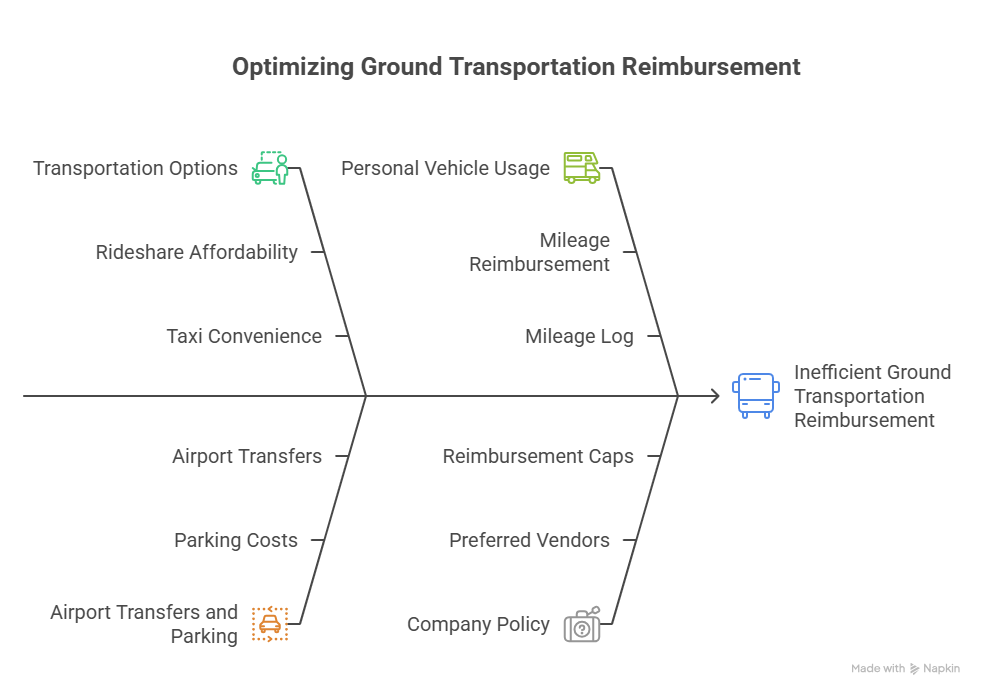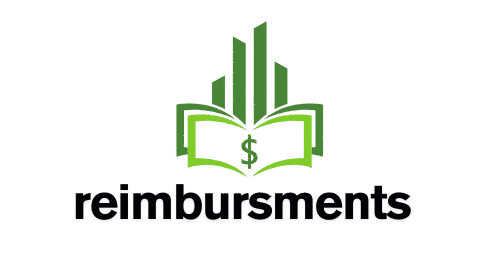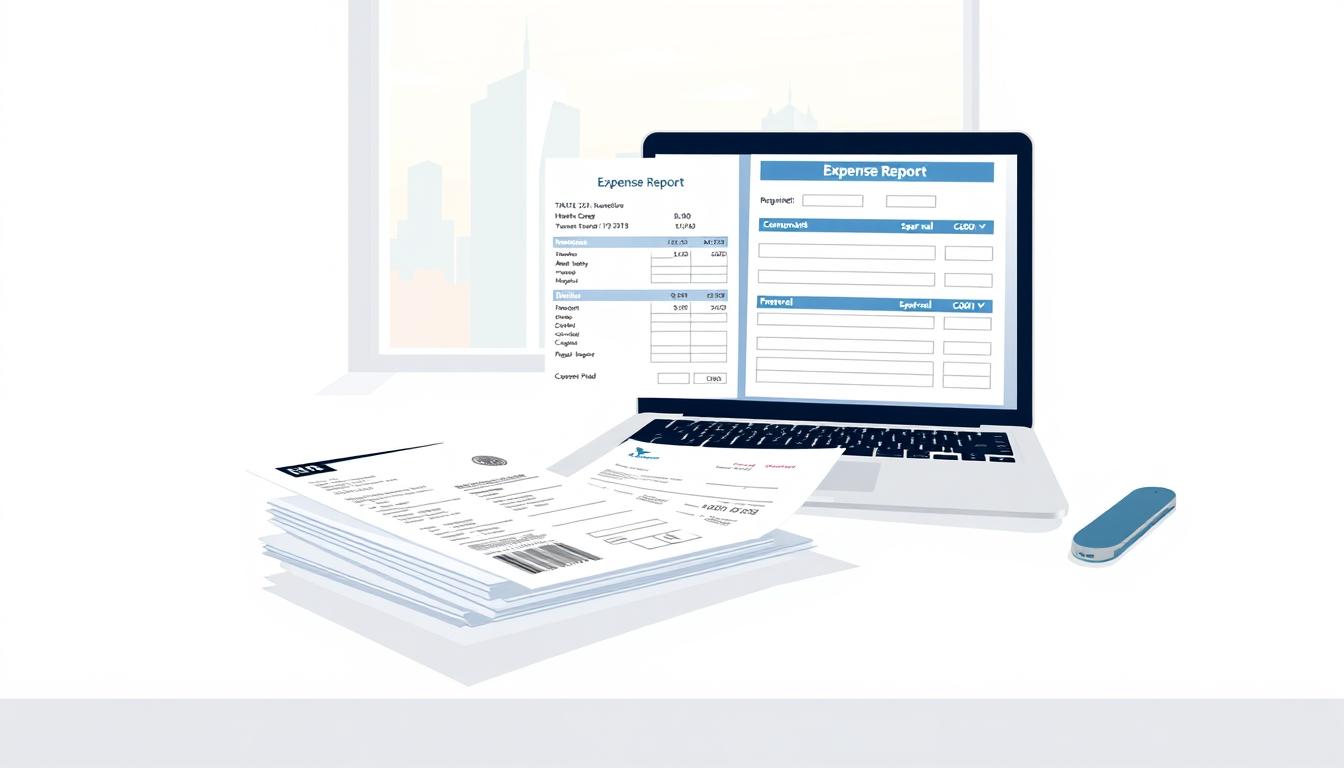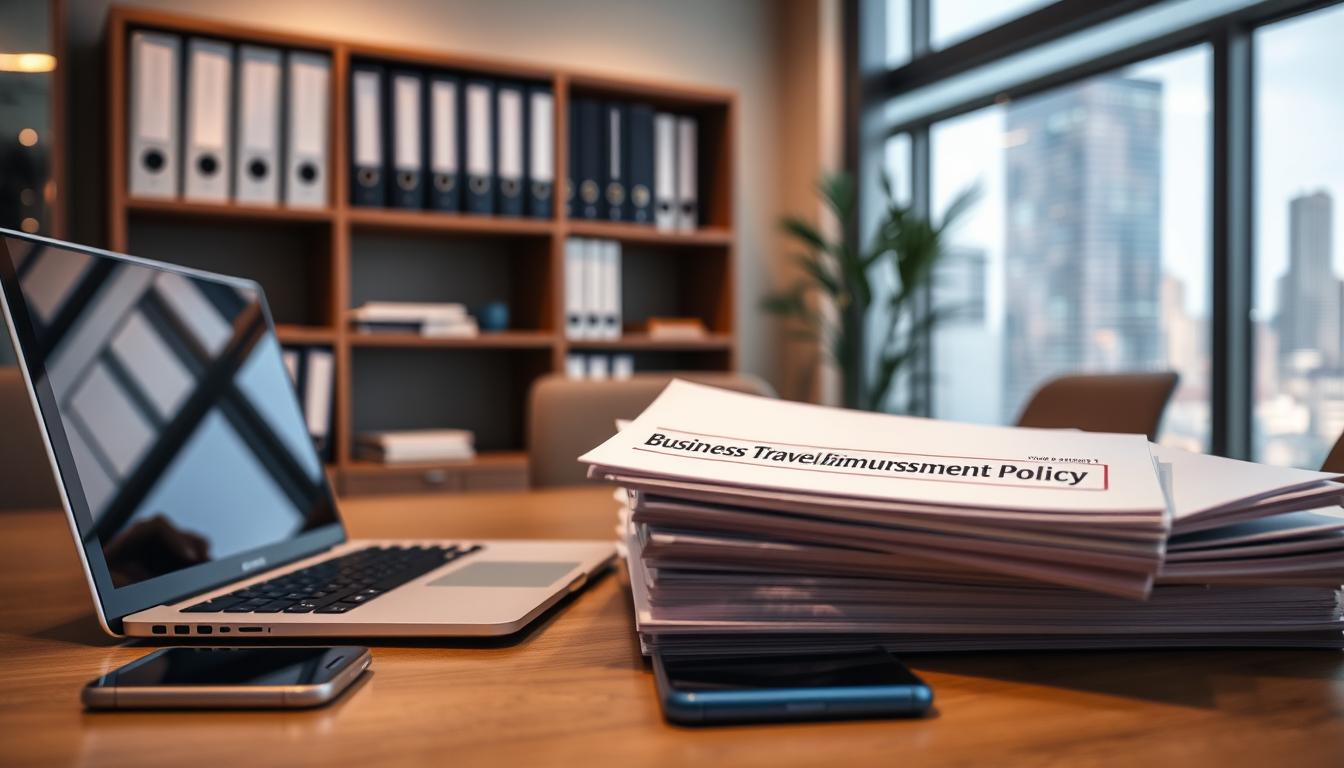Did you know that ineffective travel expense reimbursement procedures cost businesses millions of dollars every year? You can increase your profits and save time by being aware of your company’s policies.
Understanding the reimbursement policies for airfare, lodging, meals, and other costs is crucial when attending a conference. Being aware guarantees that you maximize the benefits of your company’s travel reimbursement policies in addition to easing financial strain.
You can maximize your conference travel reimbursement by being aware of these rules and putting wise tactics into practice. This guide will provide you with helpful advice on how to interpret and maximize your spending reports.
Understanding Your Company’s Travel Reimbursement Policy
A stress-free conference experience depends on knowing your company’s travel reimbursement policy. A clear policy makes it easier to plan and carry out your trip effectively.
Common Policy Components
Guidelines regarding acceptable expenses, necessary documentation, and reimbursement deadlines are typically included in corporate travel reimbursement policies. The secret to a seamless reimbursement process is becoming familiar with these elements.
| Policy Component | Description |
|---|---|
| Eligible Expenses | Expenses that can be reimbursed, such as flights, hotels, and meals. |
| Documentation Requirements | Receipts, invoices, and other documents needed to support expense claims. |
| Reimbursement Deadlines | Timeframes within which expenses must be claimed. |
Finding and Interpreting Your Policy
The resources of the finance or human resources departments usually contain your company’s travel reimbursement policy. Spend some time reading and comprehending it so that you can make well-informed travel decisions.
Knowing Your Reimbursement Deadlines
Claims may be rejected if reimbursement deadlines are missed. To prevent any problems, make sure you are aware of these deadlines.
You can ensure a hassle-free conference experience by adhering to travel reimbursement best practices and implementing efficient corporate travel reimbursement strategies by being aware of your company’s travel reimbursement policy.
Planning Ahead: Pre-Conference Reimbursement Strategies
It’s critical to plan ahead and comprehend your company’s reimbursement policies in order to maximize your conference travel budget. You can guarantee a seamless reimbursement process and save money by taking this proactive approach.
Getting Pre-Approval in Writing
Obtaining written pre-approval for your conference travel expenses is one of the best strategies to reduce costs. In addition to ensuring that you get paid for your expenses, this step can help avoid misunderstandings.
- For large expenses like hotels and flights, get pre-approval.
- Documents or emails you sent for preapproval should be kept on file.
- Speak with your finance department to clarify any special needs or limitations..
Budgeting for Out-of-Pocket Expenses
Certain costs might still need to be covered out of pocket even with preapproval. Budget-friendly conference travel advice includes putting money aside for unforeseen expenses and incidentals.
Calculate how much you spend each day on food, travel, and other ancillary costs.
To keep tabs on your spending in real time, use a budgeting app.
All purchases, no matter how minor, should be kept on file.
Using Company Credit Cards vs. Personal Cards
The reimbursement process can be made easier by using a company credit card, but it’s important to know your company’s card usage policies.
Think about the advantages and disadvantages of paying for conference travel expenses with business credit cards as opposed to personal ones. This will assist you in making wise choices and averting any problems when it comes to reimbursement.
Essential Conference Travel Reimbursement Tips
Understanding the specifics of your company’s reimbursement policy and putting best practices for expense management into practice are the first steps to maximizing your conference travel reimbursement. It’s important to be thorough in your approach to make sure you get paid for the majority, if not all, of your expenses.
Documentation Best Practices
The foundation of a successful reimbursement claim is appropriate documentation. Keeping thorough receipts for every expense, no matter how minor, is part of this. In order to receive reimbursement, it is also necessary to record the business purpose of every expense.
Digital Receipt Management
The reimbursement process can be streamlined in the current digital era by electronically managing receipts. Store and arrange your receipts using digital tools or expense management applications. In addition to clearing up clutter, this facilitates the submission of claims.
Creating Expense Categories
Keeping track of your spending and making sure you’re claiming the right reimbursements can be facilitated by classifying your expenses. Transportation, lodging, meals, and conference fees are typical categories. You can streamline the reimbursement process by classifying your expenses into these groups.
You can greatly improve your conference travel reimbursement experience by putting these crucial pointers into practice, which will guarantee that you can easily and fully claim the maximum amount of expenses that are permitted.
Maximizing Flight Reimbursements
Understanding how to optimize your flight reimbursements is crucial to getting the most out of your conference travel budget. It’s important to know your company’s travel reimbursement policy when making conference travel arrangements.
Booking Strategies for Full Coverage
Take into account the following booking techniques to guarantee complete reimbursement of your airfare:
- To guarantee better prices and a higher chance of receiving full reimbursement, book flights well in advance.
- To make the reimbursement process easier, use the travel booking platforms or agents that your business prefers.
- Unless otherwise specified by your company policy, choose economy class tickets.
Handling Baggage Fees and Seat Upgrades
Upgrades to seats and baggage fees can quickly mount up. Recognize your company’s policy regarding these extra costs in order to optimize reimbursements.
Advice: If baggage fees are deemed essential for your trip, some airlines may reimburse them.
Airline Points and Corporate Programs
Your flight costs can be greatly decreased by utilizing airline points and corporate travel programs. Numerous businesses have alliances with airlines that provide incentives or savings.
You can maximize your reimbursements and reduce your out-of-pocket costs by being aware of and taking advantage of these programs. Always inquire about any current corporate travel agreements with your employer.
Hotel Reimbursement Strategies
Knowing the specifics of hotel reimbursement plans is crucial if you want to maximize your conference travel budget. Hotel stays frequently account for a sizable amount of conference-related expenses. You can minimize out-of-pocket expenses and maximize reimbursements by using the appropriate strategies.
Conference Rate vs. Better Deals
Attendees of many conferences can take advantage of special hotel rates. These rates, though, might not always be the most economical choice. It’s worthwhile to look into additional offers or discounts that your business might accept. You can save a lot of money by comparing these rates and being aware of your company’s hotel reimbursement policy.
Incidental Expenses Coverage
Generally speaking, incidental costs like room service, minibar purchases, and in-room movies are not reimbursed by hotels. Staying within the budget can be facilitated by being aware of these costs and avoiding extraneous expenditures. Knowing the rules is essential because some businesses may have particular policies about incidental expenses.
Extended Stays and Room Sharing Policies
Knowing your company’s long-term hotel rate policy is essential for prolonged stays. Additionally, find out whether your employer permits room sharing and how it impacts reimbursement if you’re thinking about doing so with friends or coworkers. It is advisable to obtain clarification in advance as certain companies have particular regulations or limitations regarding room sharing.
You can handle hotel reimbursements more skillfully and guarantee a more seamless and economical conference travel experience by putting these cost-effective conference travel suggestions into practice and being aware of your company’s corporate travel reimbursement policies.
Meal and Per Diem Reimbursement Tactics
Business travelers must use meal and per diem reimbursement plans to reduce their out-of-pocket costs. Your entire conference travel experience can be greatly impacted by your comprehension of the specifics of these reimbursements.
Per Diem vs. Actual Expense Models
For meal reimbursements, businesses frequently employ either per diem or actual expense models. The reimbursement process is made simpler by the per diem model, which offers a daily meal allowance. On the other hand, the actual expense model necessitates thorough meal expense receipts. Comprehending the model that your organization employs is essential for efficient reimbursement.
Business Meals Documentation Requirements
For business meal reimbursements to be successful, proper documentation is essential. Make sure you maintain thorough receipts that include the meal’s date, time, location, and business purpose. Additionally, you can support your reimbursement claim by mentioning the attendees and their business affiliations.
Navigating Included Meals at Conferences
Meals are frequently included in conference registration packages. Make the necessary adjustments to your meal expenses to prevent duplicate reimbursement. For additional meals that are not covered by the conference, think about using the per diem rate.
| Meal Type | Reimbursement Eligibility | Documentation Required |
|---|---|---|
| Business Meals | Yes | Detailed receipts, business purpose |
| Conference Included Meals | No | Conference schedule or registration details |
| Personal Meals | No | None |
You can optimize your travel reimbursements and reduce administrative burdens by becoming an expert in meal and per diem reimbursement strategies. For precise instructions, always consult your company’s travel reimbursement policy.
Ground Transportation Reimbursement
Your total reimbursement during conference travel can be greatly impacted by how well you manage the costs of ground transportation. You can simplify your trip and save money by being aware of your options and the related reimbursement policies.
Rideshare vs. Taxi vs. Rental Cars
You frequently have a variety of choices when it comes to ground transportation, including traditional taxis, rental cars, and ridesharing services like Uber or Lyft.In general, ridesharing services are more affordable and provide door-to-door convenience. To find out if there are any preferred vendors or reimbursement caps for these services, it is crucial to review your company’s travel policy.
Airport Transfers and Parking Fees
Parking costs and airport transfers can quickly mount up.Carefully recording these costs is essential for reimbursement. Numerous businesses cover the cost of public transportation, shuttle services, and airport parking. Planning your trip more effectively can be achieved by being aware of what is covered by your company’s policy.
Mileage Reimbursement for Personal Vehicles
You might qualify for mileage reimbursement if you drive your own car to a conference.Since you will need to report the number of miles driven for business purposes, it is imperative that you maintain a thorough mileage log. This can be reimbursed based on your company’s mileage rate and can be a convenient option, particularly for shorter distances.
During conference travel, you can make well-informed decisions that save you money and lessen your stress by being aware of your ground transportation options and the related reimbursement policies.
Additional Reimbursable Conference Expenses
When attending conferences, there are many other costs that can be reimbursed in addition to airfare and lodging. By being aware of these, you can reduce out-of-pocket costs and increase your reimbursement.
Registration Fees and Materials
The costs of conference materials or swag bags filled with professional resources are usually covered by conference registration fees. Save your receipts for these costs.
Internet and Communication Costs
Reimbursement is frequently available for costs associated with maintaining connectivity while traveling, such as international data plans or Wi-Fi hotspots.Record these expenses just like you would any other travel-related costs.
Professional Networking Events
Many businesses pay for things like dinners and networking session tickets that are associated with professional networking events.Make sure you have attendance records and receipts for these events.
Keep thorough records and adhere to your company’s travel reimbursement policy in order to be compensated for these costs. This will facilitate the efficient reimbursement of conference travel expenses.
Technology Tools for Expense Tracking and Submission
A variety of technological tools are now available to modern professionals to streamline the tracking and submission of conference travel expenses. These tools lessen the administrative load on finance departments and employees alike, while also streamlining the reimbursement process.
Expense Management Apps
The way professionals track and manage their expenses has been completely transformed by expense management apps like Concur and Expenseify. These applications make it simple for users to record receipts, classify spending, and produce reports.
Digital Receipt Organization Systems
Systems for organizing digital receipts are yet another essential tool for controlling conference travel costs. Professionals can make sure their receipts are easily accessible for reimbursement purposes and are not lost by storing them digitally.
Automated Expense Report Generation
By automatically assembling spending information into thorough reports, automated tools for creating expense reports save time and minimize errors. For conference travel, where costs can vary greatly, this feature is especially helpful.
Professionals can guarantee a more seamless and effective conference travel reimbursement procedure while following best practices for travel reimbursement by utilizing these technological tools.
Handling International Conference Travel Reimbursements
Although handling international conference travel reimbursements can be challenging, you can optimize your reimbursements by using the appropriate tactics. One of the best ways to grow your professional network and learn about the newest trends in the industry is to attend conferences overseas. However, receiving payment for these kinds of trips presents a number of particular difficulties.
Currency Conversion Documentation
Managing currency conversion is one of the most important parts of international travel reimbursement. It’s crucial to keep track of the exchange rates you used for your expenses in order to guarantee that you get paid accurately.Note the exchange rate at the time of the transaction and save receipts for every transaction. Having this information on hand can make the reimbursement process easier because many businesses use the exchange rate on the day of the transaction.
International Receipt Requirements
When traveling abroad, receipt requirements can differ greatly. Receipts in certain nations may have particular formats or be required to be in the local tongue.To prevent any problems with your reimbursement, it is essential that you comprehend these requirements. Always request receipts in English, if at all possible, and make sure the date, amount, and expense description are included.
Special Considerations for Global Travel
Traveling abroad presents a unique set of difficulties, such as disparate cultural norms and tax laws. For example, different nations have different laws governing how meal expenses must be documented. You can handle the reimbursement process more skillfully if you are aware of these unique factors. Additionally, you can greatly expedite the process by keeping a record of your expenses and their respective business purposes.
You can guarantee a more seamless experience and optimize your reimbursements by being aware of and ready for these facets of international conference travel reimbursements. Your overall financial result can be greatly impacted by putting corporate travel reimbursement strategies into practice that are specific to international travel.
Navigating Reimbursement Denials and Appeals
There are steps you can take to appeal a reimbursement denial, so it’s not the end of the road. Conference attendees must comprehend the rationale behind denials and know how to successfully appeal them.
Common Reasons for Denial
Frequently, incomplete documentation, exceeding daily limits, or submitting expenses outside of the company’s policy result in reimbursement denials. These problems can be avoided by making sure your receipts are thorough and meet your company’s specifications.
Building a Strong Appeal Case
Keep track of all correspondence and receipts pertaining to the expense in order to create a compelling case. Give a clear explanation of the expense’s goal and how it connects to the business activity or conference.
When to Involve Management
It might be necessary to involve management if your initial appeal is rejected.Clarifying company policies and resolving conflicts can be achieved by elevating the issue.

Conclusion: Becoming a Conference Travel Reimbursement Pro
Conference travel reimbursements can be tricky to navigate, but with the correct tactics, you can reduce out-of-pocket costs and maximize reimbursements. You can guarantee a more seamless reimbursement process by being aware of your company’s travel reimbursement policy and putting cost-effective conference travel advice into practice.
A thorough understanding of what costs are reimbursable, timely submissions, and thorough documentation are all necessary for the efficient administration of conference travel reimbursements. Receiving reimbursement for conference travel allows you to concentrate on what really counts: maximizing your conference experience and using it to advance your career.
You can maximize your company’s reimbursement policies, have a stress-free conference experience, and become an expert at conference travel reimbursement by putting the advice and techniques in this article to use.
FAQ
What are the most common components of a company’s travel reimbursement policy?
The majority of business travel reimbursement policies contain information about acceptable costs, reimbursement caps, necessary paperwork, and submission deadlines. To maximize reimbursements, it is essential to comprehend these elements.
How can I ensure I’m reimbursed for all my conference travel expenses?
Maintaining thorough records of all expenditures, including invoices and receipts, is crucial to guaranteeing complete reimbursement. Getting pre-approved for expenses and being aware of your company’s reimbursement policy can also be beneficial.
What’s the difference between per diem and actual expense reimbursement models for meals?
While actual expense reimbursement necessitates proof of actual meal costs, per diem reimbursement offers a daily allowance for meals regardless of actual expenses. Knowing which model your business uses is essential for reimbursement and budgeting.
Can I be reimbursed for expenses related to professional networking events during a conference?
Yes, if an expense is considered business-related, many companies will reimburse it for professional networking events like dinners or social gatherings. It’s critical to keep track of these costs and comprehend your organization’s reimbursement policy.
How do I handle currency conversion for international conference travel reimbursements?
Maintaining receipts in the local currency and recording currency conversions are essential when traveling abroad. Certain businesses might have particular needs or favored approaches when it comes to currency conversion.
What are some effective technology tools for tracking and submitting conference travel expenses?
Tracking and submitting expenses can be made much easier with the help of automated expense report generation tools, digital receipt organization systems, and expense management apps. These tools lessen the administrative load and aid in keeping records organized.
What should I do if my reimbursement is denied?
If a reimbursement request is turned down, find out why, get more information or supporting documentation if needed, and prepare a compelling appeal. Resolving the issue also requires knowing when to involve management.
How can I maximize my flight reimbursements?
Booking tactics, knowledge of airline regulations, and utilizing corporate programs or airline points are all necessary to maximize flight reimbursements. It’s also critical to understand how your company’s policy handles any additional fees, like baggage fees.
Are there any specific considerations for ground transportation reimbursement?
Maximizing reimbursements for ground transportation can be achieved by comparing options such as ridesharing, taxis, or rental cars, as well as by being aware of regulations regarding airport transfers, parking costs, and personal vehicle mileage reimbursement.




